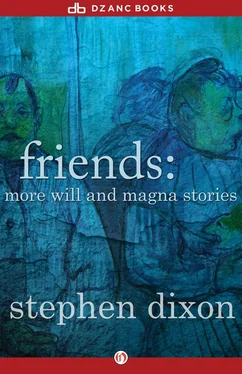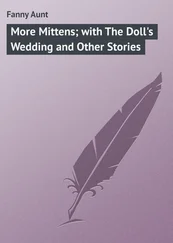Stephen Dixon - Friends - More Will and Magna Stories
Здесь есть возможность читать онлайн «Stephen Dixon - Friends - More Will and Magna Stories» весь текст электронной книги совершенно бесплатно (целиком полную версию без сокращений). В некоторых случаях можно слушать аудио, скачать через торрент в формате fb2 и присутствует краткое содержание. Год выпуска: 2014, Издательство: Dzanc Books, Жанр: Современная проза, на английском языке. Описание произведения, (предисловие) а так же отзывы посетителей доступны на портале библиотеки ЛибКат.
- Название:Friends: More Will and Magna Stories
- Автор:
- Издательство:Dzanc Books
- Жанр:
- Год:2014
- ISBN:нет данных
- Рейтинг книги:3 / 5. Голосов: 1
-
Избранное:Добавить в избранное
- Отзывы:
-
Ваша оценка:
- 60
- 1
- 2
- 3
- 4
- 5
Friends: More Will and Magna Stories: краткое содержание, описание и аннотация
Предлагаем к чтению аннотацию, описание, краткое содержание или предисловие (зависит от того, что написал сам автор книги «Friends: More Will and Magna Stories»). Если вы не нашли необходимую информацию о книге — напишите в комментариях, мы постараемся отыскать её.
Friends: More Will and Magna Stories — читать онлайн бесплатно полную книгу (весь текст) целиком
Ниже представлен текст книги, разбитый по страницам. Система сохранения места последней прочитанной страницы, позволяет с удобством читать онлайн бесплатно книгу «Friends: More Will and Magna Stories», без необходимости каждый раз заново искать на чём Вы остановились. Поставьте закладку, и сможете в любой момент перейти на страницу, на которой закончили чтение.
Интервал:
Закладка:
I go back to the bench. “Almost here,” the man says. “You can see the locomotive’s light on the rails. Another reason I prefer The Montrealer is it’s much roomier inside. And window curtains. You laugh, but if you want to sleep all you have to do is draw the curtain, put your legs up on the leg rest and conk out. In the morning the curtains are only useful against the sun if you sit on the left side of the train going south. Which side would that be? I should know. I’m the engineer. The left side would be, well — heading south — let’s see. My left hand. I’m going south.” He holds out his left hand, faces the direction the train’s coming from. “South,” he says. “I’m going south. It would have to be east, of course, the left side, wouldn’t it?”
“I think so.”
“I don’t know why it’s suddenly so confusing. But we’ll say east. I must have a block about it. It has to be east, that’s right. All that water from the Susquehanna and Chesapeake we pass pouring into the inlet. The tankers docked in Wilmington. And God help me, the sun rises there also. So the curtains are only useful on the east side in the morning, but I usually sit—”
“There’s the train.”
“Great,” and he picks up his valise. I hold my bag and briefcase. The train stops. Lots of people are around us now. We stand to the side of the door as the conductor and passengers come out.
“Which one’s the nonsmoking?” I ask the conductor.
“Rear car and one to your left.”
I go to the door on my left. The man’s right behind me. I go in and he says “I smoke, but don’t have to — I’ve in fact been warned not to, so if you want to continue our conversation?”
“I have to go much farther — something about the backs of trains.”
“You can’t go too much farther and you’re not that far back. Next one’s probably a smoking car and then the club car and after that the dining car they won’t let you into till about eight.”
“I’ll try. Nice talking to you.” I walk through the car, turn around at the end of it and see him putting his valise on the luggage rack. He sees me and points to the seats under the rack. I shake my head, point to the next car and tap the door-opening device.
I don’t want to sit in the smoking car so I go into the club car. There don’t seem to be too many smokers at the tables. I get a beer from the service bar, sit at an empty table, give the trainman my ticket and get back a seat check.
“Mr. Taub,” a young man says. I look up. I don’t recognize him. Dark sunglasses, bangs almost over his eyes.
“Ed Shekian. I was in Ida’s class last term.”
“Ida?” I’m sitting and he’s standing.
“Ida Rulowitz. She invited you to speak to us because you’re the expert in I don’t know what. Robert Frost, I think.”
“Wallace Stevens?”
“That’s right, Stevens, Pound and Eliot. You said you knew more about Stevens’ work than Pound or Eliot, but that you maybe knew enough of their work for our class. It was an introduction to contemporary lit. Well, I saw you running up the aisle past me before and I thought ‘Whew, Mr. Taub, there he goes, I got to get him,’ so I just dumped my stuff on a seat and ran after you. You remember Ida. How is she, you know?”
“Oh sure, Ida. She had an awful accident.”
“A woman on a motorcycle with about ten hours experience on it and on a major highway and without a crash helmet no less. That is just stupid, as smart a teacher and nice a person as she is.”
“Yeah, god, awful. Someone told me about her only last week. I didn’t know. The school’s so big. She was supposed to be getting out of intensive care this week, this person said.”
“I knew that. I thought you might’ve known more. I wanted to visit her but they said not yet. Her boyfriend did. Look, excuse me for presenting this to you like this, but remember you said you’d do a radio interview for us?”
“For you? Did I? In what way?”
“For the campus radio station. You see, this year I’ve even a bigger position than I had last year. Not only chief engineer but the program coordinator too, and I’m trying to boost the programs on literary content a notch. You said, when a few of us talked to you after class, that you’d let yourself be interviewedin a Q and A session and maybe then would read some contemporary poems you like. Would you still be interested?”
“I don’t know. I don’t like to be on programs or even panels. I’m not asked that much, granted, but the microphone and I aren’t great friends.”
“Oh, I’ve seen you introduce poets here. You do a terrific job. And we loved you in Ida’s class. Most of us thought that could’ve been the best one all semester.”
“I still don’t know. Listen, why don’t you sit? You want a beer? I’m having one.”
“Sure, why not, this is great. I love meeting teachers like you who are famous on their own and also are great teachers and just talking with them casually like this. I’ll be right back.”
“You have enough money?”
“Why wouldn’t I? You mean for the beer?”
“Since I invited you, and I make more than enough, which partly comes from your tuition. And you must be paying — are you an out-of-town student?”
“From Staten Island. It costs a fortune, but I help out with three thousand of it. My father said — well it wasn’t even that. I just think it’s what I should do, contribute to my education monetarily.”
“Three thousand’s a lot though.”
“I work as a mason in the summer. Not a full mason but a step above apprentice. The mason I work under—”
“Why don’t you get your beer?”
“Right. Your neck must be hurting, looking at me turned around.”
He gets a beer, comes back, sits opposite me. He tells me why he chose our university, what he thinks of sharing an apartment with three men, the premed courses he’s not doing very well in, his mother who was terminally ill for three years and which made him choose medicine as a career. His father and younger brothers: “They’re going to be so surprised when I walk in the door.”
“Maybe you should call them from the station. People today get alarmed when the door opens and you don’t expect anyone.”
“No, they like surprises from me. Just like my girl will too.”
“Now she you definitely should have told you were coming. You know, I’m not saying anything, but you don’t want to set yourself up for being embarrassed or hurt.”
“She’s okay. I’ll show up tomorrow early. She lives with her folks.”
“I’m sure you’re right.” I yawn. “Sorry — just a little sleepy. It’s been a hectic week. But go on.”
We’re pulling into Aberdeen. We must have been speaking half an hour. He’s talking about the fifty hours a week he works at the campus radio station. “I do it because I love it. I’d have to — I don’t get paid.” About the difference of being a freshman and sophomore. Ida and her accident. Some of the interesting people he’s met here: teachers, students. The time he barged into the university president’s office to get more money for the station. I’m yawning again. “Did you really?” I say. The train pulls out of Wilmington. My glass is empty. I don’t know whether to excuse myself and go back to the nonsmoking car or stay here. I don’t want to hurt his feelings. I do want to get some rest. Oh, put up with it a little more. Best way is with another beer.
“I’m going to have another,” I say, standing up. “Can I get you one?”
“Sure, why not? No, I probably shouldn’t. Two with no food in me makes me high.”
“Then you better not. I forgot how old you are you speak so well. That’s not a put-down either. You’re very articulate and mature and have done a lot of things with your life. Then I’m going to go in back now, if you don’t mind, and find a seat.”
Читать дальшеИнтервал:
Закладка:
Похожие книги на «Friends: More Will and Magna Stories»
Представляем Вашему вниманию похожие книги на «Friends: More Will and Magna Stories» списком для выбора. Мы отобрали схожую по названию и смыслу литературу в надежде предоставить читателям больше вариантов отыскать новые, интересные, ещё непрочитанные произведения.
Обсуждение, отзывы о книге «Friends: More Will and Magna Stories» и просто собственные мнения читателей. Оставьте ваши комментарии, напишите, что Вы думаете о произведении, его смысле или главных героях. Укажите что конкретно понравилось, а что нет, и почему Вы так считаете.












